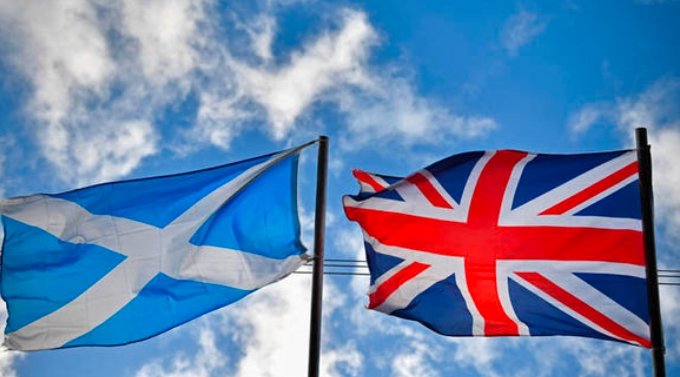Aberdeenshire Council in Scotland has stopped removing Saltire flags from lampposts after workers faced serious threats and intimidation. This decision came on September 4, 2025, as the council sought help from Police Scotland to ensure staff safety before resuming the work.
The flags appeared in large numbers across towns following a social media push by groups linked to anti-asylum seeker protests. Councils view them as unauthorized and a potential danger to public safety.
Background on the Saltire Flag Campaign
The Saltire, Scotland’s national flag, has been tied to lampposts in places like Peterhead and Aberdeen over recent weeks. A Facebook group called Save Our Future and Our Kids Future started the campaign, urging people to display the flags as a show of national pride.
This effort gained traction amid broader discussions on immigration and Scottish identity. Supporters say it promotes unity, but critics link it to far-right sentiments seen in similar flag displays in England.
Many flags went up without permission, leading to quick responses from local authorities. The campaign has raised questions about free expression versus public order.
The group behind it expressed disgust at the removals and launched a fundraiser to buy more flags. This has sparked debates on social media about patriotism and protest methods.

Reasons Councils Give for Flag Removals
Local councils argue that unauthorized flags on streetlights create real safety risks. They can distract drivers or fall during bad weather, endangering people below.
Aberdeenshire Council pointed out that attaching items to lampposts is illegal and could damage infrastructure. They also noted a rise in flags painted on roads, which they see as vandalism.
Falkirk Council echoed these concerns, stating workers removed flags for safety reasons alone. They stressed that no political motives were involved, focusing only on public well-being.
Here are key reasons cited by councils for removing the flags:
- Safety hazards from loose attachments on busy roads
- Legal issues with unauthorized use of public property
- Potential damage to streetlights and electrical systems
- Reports of painted flags on roads, seen as unlawful markings
Aberdeen City Council joined in, confirming they too are taking down flags to prevent accidents.
Incidents of Threats and Intimidation
Workers in Aberdeenshire faced direct threats while using cherry pickers to remove flags. The council reported abuse severe enough to pause operations on September 4, 2025.
In one case, staff in Peterhead encountered hostile crowds, forcing them to stop. Similar events happened in Falkirk, where employees reported intimidation that blocked their tasks.
Police Scotland has been called in to investigate. They stated that while flag removal is a council matter, threats to workers are criminal and will be addressed.
The Scottish Trades Union Congress condemned the behavior as despicable, urging respect for public employees. No arrests have been reported yet, but inquiries continue.
These incidents highlight growing tensions around symbolic protests in Scotland.
Responses from Authorities and Groups
Aberdeenshire Council vowed to resume removals with police support. They plan to hand removed flags to local stations for owners to collect, avoiding destruction.
Falkirk Council promised action against those responsible for threats, working closely with law enforcement. They emphasized that worker safety comes first.
The group Save Our Future and Our Kids Future called the councils’ actions overreach. They fundraised online, claiming the flags represent peaceful patriotism.
Police Scotland advised that any threats should be reported immediately. They aim to balance free speech with public safety in these cases.
| Council | Action Taken | Key Issue Reported |
|---|---|---|
| Aberdeenshire | Suspended removals, seeking police help | Threats to workers during operations |
| Falkirk | Removed some flags, liaising with police | Intimidation preventing task completion |
| Aberdeen City | Ongoing removals | Safety concerns on urban streets |
This table shows how different areas are handling the situation as of September 5, 2025.
Public Reactions and Broader Impact
Public opinion splits on the issue. Some Scots support the flags as a nod to national pride, especially amid talks of independence referendums.
Others worry it ties into anti-immigration views, similar to recent protests in England. Social media buzzes with debates, with thousands sharing views on platforms like X.
Anti-immigration groups feel targeted, while unions back the workers. This echoes past flag disputes, like those during Scottish independence campaigns.
The events tie into current trends, including First Minister John Swinney’s recent plans for another independence vote. They raise questions about how symbols fuel division.
Similar Cases in Other Regions
Beyond Aberdeenshire and Falkirk, other areas report issues. In Merseyside, England, council workers faced threats over Union Jack and St. George’s flags.
Knowsley Council called the behavior unacceptable, mirroring Scottish experiences. Cornwall Council also vowed to remove British flags from lampposts, citing disrespect.
These cases show a pattern across the UK, where flag displays spark conflict. In Scotland, the Saltire’s use adds a layer of national identity to the mix.
Experts note this reflects rising populism, with flags becoming tools in social debates.
What Happens Next for Flag Removals
Councils plan to continue removals safely, with police escorts if needed. They urge calm and legal protests instead of threats.
The situation could evolve if more flags appear or if arrests occur. Watch for updates from Police Scotland and local authorities.
This story underscores the need for dialogue on national symbols and worker rights. It may influence how future protests are handled in Scotland.
Share your thoughts on this flag controversy in the comments below, and pass this article along to spark discussion with friends.


















